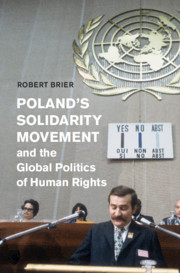Book contents
- Poland’s Solidarity Movement and the Global Politics of Human Rights
- Human Rights in History
- Poland’s Solidarity Movement and the Global Politics of Human Rights
- Copyright page
- Dedication
- Contents
- Acknowledgments
- Note on Geographical Regions
- Note on Cited Primary Documents
- Abbreviations
- Introduction
- 1 The Rise of Dissent in Poland
- 2 Dissent and the Politics of Human Rights
- 3 The Principle of Noninterference as Laid Down in the Helsinki Final Act
- 4 The End of the Ideological Age
- 5 Solidarity, Human Rights, and Anti-Totalitarianism in France
- 6 The “Bedrock of Human Rights”
- 7 Letters from Prison
- 8 Lech Wałęsa, the Symbolism of the Nobel Peace Prize, and Global Human Rights Culture
- 9 General Pinochecki
- 10 Human Rights and the End of the Cold War
- Epilogue
- Bibliography
- Index
4 - The End of the Ideological Age
Human Rights and Ostpolitik
Published online by Cambridge University Press: 28 May 2021
- Poland’s Solidarity Movement and the Global Politics of Human Rights
- Human Rights in History
- Poland’s Solidarity Movement and the Global Politics of Human Rights
- Copyright page
- Dedication
- Contents
- Acknowledgments
- Note on Geographical Regions
- Note on Cited Primary Documents
- Abbreviations
- Introduction
- 1 The Rise of Dissent in Poland
- 2 Dissent and the Politics of Human Rights
- 3 The Principle of Noninterference as Laid Down in the Helsinki Final Act
- 4 The End of the Ideological Age
- 5 Solidarity, Human Rights, and Anti-Totalitarianism in France
- 6 The “Bedrock of Human Rights”
- 7 Letters from Prison
- 8 Lech Wałęsa, the Symbolism of the Nobel Peace Prize, and Global Human Rights Culture
- 9 General Pinochecki
- 10 Human Rights and the End of the Cold War
- Epilogue
- Bibliography
- Index
Summary
This chapter deals with the response of Willy Brandt, West Germany’s former chancellor and towering moral figure, to the 1981 imposition of martial law in Poland. As Chancellor, Brandt had played a central role in putting human rights-related questions into the Final Act of the Conference on Security and Cooperation in Europe (CSCE) and thus on the agenda of East-West relations. In December 1981, however, he demanded Western restraint toward events in Poland and even expressed some understanding for the Polish government. To explain this stance, this chapter deciphers the ideas and wider imaginaries that informed his actions, an approach that also provides insights into the intellectual changes that powered the human rights revolution of the 1970s and the 1980s. Brandt, this chapter shows, understood human rights work in a way indebted to 1950s and 1960s discourses revolving around a vision of competing political and social systems, of antagonistic ways of organizing society, of fundamentally different views of how long-term historical processes shaped the fate of nations. Enmeshed in this culture, Brandt believed that a successful human rights policy had to take structural constraints and broad time horizons into account. The demands of the dissidents—calling upon the international community to intervene for the human rights of everyone, everywhere—seemed to Brandt not morally objectionable so much as implausible and unreasonable.
Keywords
- Type
- Chapter
- Information
- Publisher: Cambridge University PressPrint publication year: 2021

